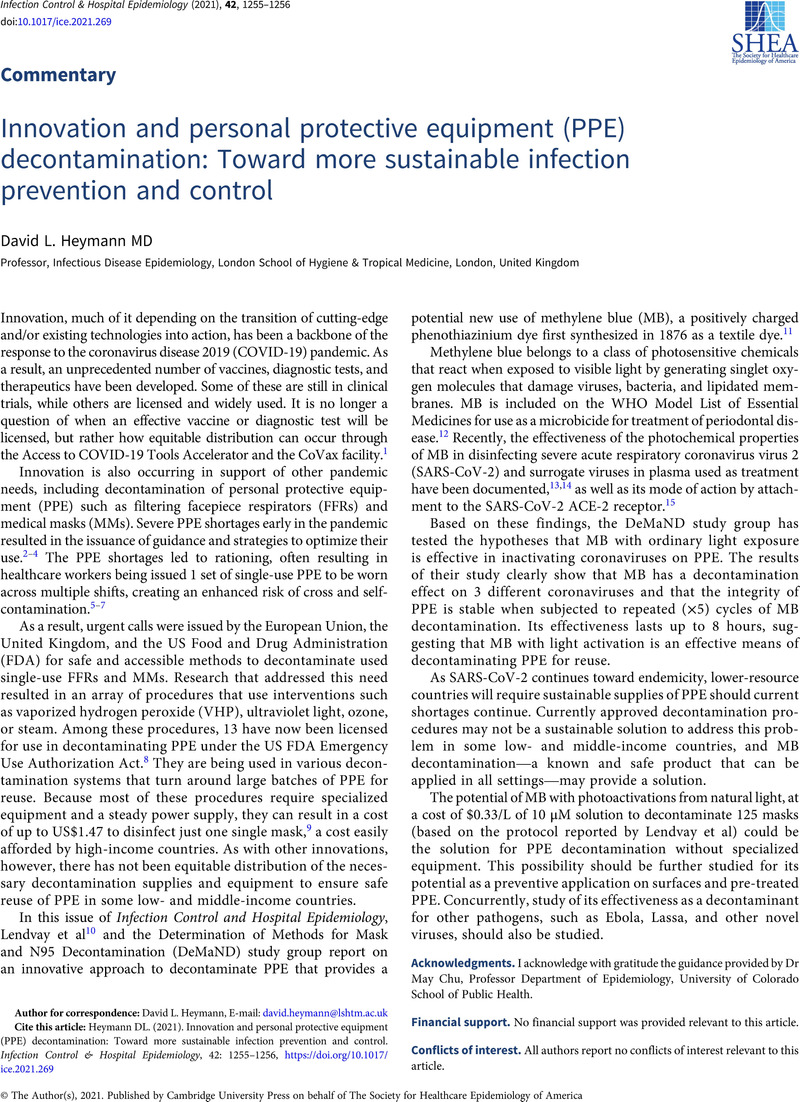No CrossRef data available.
Article contents
Innovation and personal protective equipment (PPE) decontamination: Toward more sustainable infection prevention and control
Published online by Cambridge University Press: 08 July 2021
Abstract
An abstract is not available for this content so a preview has been provided. Please use the Get access link above for information on how to access this content.

- Type
- Commentary
- Information
- Copyright
- © The Author(s), 2021. Published by Cambridge University Press on behalf of The Society for Healthcare Epidemiology of America
References
COVAX: working for global equitable access to COVID-19 vaccines. World Health Organization website. https://www.who.int/initiatives/act-accelerator/covax. Accessed May 20, 2021.Google Scholar
Rational use of personal protective equipment for coronavirus disease (COVID-19) and considerations during severe shortages-interim guidance, April 6, 2020. World Health Organization website. https://apps.who.int/iris/bitstream/handle/10665/331695/WHO-2019-nCov-IPC_PPE_use-2020.3-eng.pdf. Accessed May 1, 2021.Google Scholar
Optimizing personal protective equipment (PPE) supplies. US Centers for Disease Control and Prevention website. https://www.cdc.gov/coronavirus/2019-ncov/hcp/ppe-strategy/index.html. Updated July 16, 2020. Accessed May 1, 2021.Google Scholar
Cloth masks and mask sterilization as options in case of shortage of surgical masks and respirators. European Centre for Disease Prevention and Control website. https://www.ecdc.europa.eu/sites/default/files/documents/Cloth-face-masks-in-case-shortage-surgical-masks-respirators2020-03-26.pdf. Published March 26, 2020. Accessed May 9, 2021.Google Scholar
Srinivas, G, Maanasa, R, Meenakshi, M, et al. Ethical rationing of healthcare resources during COVID-19 outbreak: review. Ethics Med Pub Health 2021;16:100633.Google ScholarPubMed
Jessop, AM, Dobbs, TD, Ali, SR, et al. Personal protective equipment for surgeons during COVID-19 pandemic: systematic review of availability, usage and rationing. Brit J Surg 2020;107:1262–1280.CrossRefGoogle ScholarPubMed
O’Neal, L, Heisler, M, Mishori, R, Haar, RJ. Protecting providers and patients: results of an Internet survey of healthcare workers’ risk perceptions and ethical concerns during the COVID-19 pandemic. Int J Emergency Med 2021;14:18.CrossRefGoogle Scholar
Decontamination system EUAs for personal protective equipment. US Food and Drug Administration website. https://www.fda.gov/medical-devices/coronavirus-disease-2019-covid-19-emergency-use-authorizations-medical-devices/decontamination-system-euas-personal-protective-equipment. Accessed April 30, 2021.Google Scholar
Weinheimer, CM, Ellsworth, M, Ferguson, L, et al. Reprocessing N95s with hydrogen peroxide vaporization: a robust system from collection to dispensing. Am J Infect Control 2021;49:508–511.CrossRefGoogle ScholarPubMed
Lendvay, TS, Chen, J, Harcourt, BH, et al. Addressing personal protective equipment (PPE) decontamination: methylene blue and light inactivates SARS-CoV-2 on N95 respirators and medical masks with maintenance of integrity and fit. Infect Control Hospital Epidemiol 2021. doi: 10.1017/ice2021.230.CrossRefGoogle Scholar
Wainwright, N, Crossley, KB. Methylene blue-a therapeutic dye for all seasons? J Chemo 2013. doi: 10.1179/joc.2002.14.5.431.Google Scholar
Model list of essential medicines–21st list, 2019. World Health Organization website. https://www.who.int/publications/i/item/WHOMVPEMPIAU2019.06. Accessed May 20, 2021.Google Scholar
Duan, K, Liu, B, Li, D, et al. Effectiveness of convalescent plasma therapy in severe theapy in severe COVID-19 patients. Proc Nat Acad Sci 2020;117:9490–9496.CrossRefGoogle Scholar
Jin, C, Yu, B, Zhang, J, et al. Methylene blue photochemical treatment as reliable SARS-CoV-2 plasma virus inactivation method for blood safety and convalescent plasma therapy for COVID-19. BMC Infect Dis 2021;21:357.CrossRefGoogle ScholarPubMed
Bojadzic, D, Alcazar, O, Buchwald, P. Methylene blue inhibits the SARS-CoV-2 spike–ACE-2 protein–protein interaction—a mechanism that can contribute to its antiviral activity against COVID-19. Front Pharmacol 2021;11:600372.CrossRefGoogle ScholarPubMed



